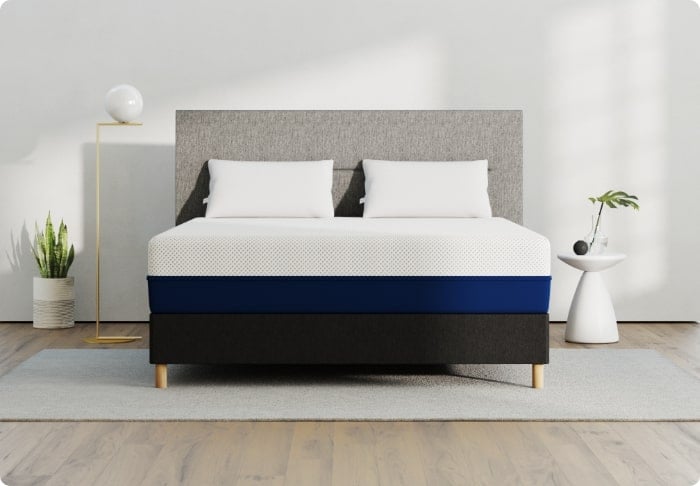How to Sleep Before a Job Interview

Key Takeaways
- Create a calming evening routine: Start winding down at the same time each night with relaxing activities like reading or taking a warm bath. Avoid screens, caffeine, and heavy meals for several hours before bed to help your body naturally prepare for sleep.
- Prepare everything the night before: Lay out your complete outfit, pack your interview materials, set multiple alarms, and plan your route. This eliminates morning stress and racing thoughts about forgetting something important.
- Use breathing techniques to manage anxiety: Practice the 4-7-8 breathing method (inhale for 4, hold for 7, exhale for 8) to calm your nervous system when anxious thoughts keep you awake. Focus on deep belly breathing rather than shallow chest breaths to activate your body’s relaxation response.
Getting a good night’s sleep before your job interview can make the difference between landing your dream job and missing out on a great opportunity. Your brain works better, your memory stays sharp, and you feel more confident when you wake up well-rested.
Many people toss and turn the night before big interviews because nerves and excitement keep their minds racing. This restless night often leads to feeling groggy, forgetting important details, and appearing less enthusiastic during the actual interview.
Smart job seekers know that preparing for sleep deserves just as much attention as preparing their answers to common interview questions. The hours you spend sleeping give your body and mind the chance to recharge and get ready for peak performance.
Follow these proven strategies to calm your nerves, create the perfect sleep environment, and wake up feeling refreshed and ready to impress.
Ready to sleep soundly and nail your next interview? Read on for expert tips that will help you rest easy and wake up confident.
Why Quality Sleep Matters
Sleep directly affects how well your brain works during important moments like job interviews. When you get enough rest, you think faster, remember details better, and make smarter decisions under pressure.
Poor sleep makes you feel foggy, causes you to stumble over words, and reduces your ability to read social cues from interviewers. Well-rested candidates appear more alert, enthusiastic, and professional, which creates a strong first impression.
Your body language also improves with good sleep, helping you sit up straight, make eye contact, and project confidence throughout the entire interview process.
Evening Routines
Your evening routine sets the stage for quality sleep and interview success. Creating the right habits before bedtime helps your body and mind prepare for rest naturally.
Build a Calming Bedtime Schedule
Start your bedtime routine at the same time every night to train your body when to feel sleepy. Choose relaxing activities like reading a book, taking a warm bath, or listening to soft music to signal that sleep time approaches.
These calm activities help slow down your racing thoughts about tomorrow’s interview. Stick to the same order of activities each night so your brain recognizes the pattern and begins releasing sleep hormones.
Avoid checking work emails or scrolling through social media during this wind-down time since these activities can spike your stress levels. Give yourself at least one hour of peaceful activities before you plan to fall asleep.
Your body needs this transition time to shift from the busy energy of daytime to the restful state required for deep sleep.
Choose Your Evening Meal Wisely
Eat your dinner at least two to three hours before bedtime to give your stomach enough time to digest the food properly. Choose lighter foods like grilled chicken with vegetables, a small salad, or a bowl of soup instead of heavy, greasy meals that can keep you awake.
Avoid spicy foods that might cause heartburn or make you feel uncomfortable while lying down. Foods high in sugar can give you a burst of energy right when you need to feel calm and sleepy.
If you feel hungry closer to sleep, try a small bedtime snack like a banana, a handful of nuts, or a piece of whole grain toast. These foods contain natural compounds that can actually help promote better sleep.
Remember that going to bed either too full or too hungry can both disrupt your sleep quality. So avoid eating too close to bed but don’t go without eating!
Skip the Stimulants
Stop drinking coffee, tea, and energy drinks at least six hours before your planned bedtime since caffeine stays in your system much longer than most people realize. Even that afternoon cup of coffee can still affect your ability to fall asleep later that night.
Chocolate also contains caffeine, so avoid eating chocolate bars or drinking hot chocolate in the evening. Your body needs time to clear these substances from your system so they don’t interfere with your natural sleep patterns.
You can indulge in a herbal tea for sleep, however. Just avoid caffeinated varieties!
Managing Your Mind
Interview anxiety can make your mind race with worried thoughts that keep you wide awake. Learning simple techniques to calm your emotions helps you relax both your body and mind for better sleep.
Use Breathing Techniques to Stay Calm
Deep breathing exercises work quickly to reduce stress and signal your nervous system to relax. Try the 4-7-8 technique by breathing in through your nose for four counts, holding your breath for seven counts, then exhaling through your mouth for eight counts.
Repeat this pattern three to four times while lying in bed to slow down your heart rate and calm anxious thoughts. Focus only on counting your breaths instead of thinking about interview questions or what might go wrong tomorrow.
Place one hand on your chest and another on your stomach to make sure you breathe deeply into your belly rather than taking shallow chest breaths. This type of breathing activates your body’s relaxation response and helps counteract the stress hormones that keep you alert.
Practice these breathing exercises during the day so they feel natural when you need them most at bedtime.
Practice Mental Preparation
Spend time visualizing yourself succeeding in the interview to build confidence and reduce anxiety about unknown situations. Picture yourself walking into the office calmly, shaking hands firmly with the interviewer, and answering questions with clear, thoughtful responses.
Imagine the interviewer smiling and nodding as you share your accomplishments and explain why you want the job. This positive mental rehearsal helps your brain feel more familiar and comfortable with the upcoming experience.
Write down three key points you want to share about yourself so your mind stops worrying about forgetting important details. Review your research about the company and role one final time, then put those notes away and trust that you know enough.
Remind yourself of past successes and challenges you’ve overcome to boost your confidence before sleep.
Get Everything Ready Tonight
Prepare everything you need for the interview before you go to bed so morning stress doesn’t ruin your good night’s sleep. Lay out your complete outfit including shoes, accessories, and any backup clothing options in case of spills or wardrobe malfunctions.
Print extra copies of your resume and put them in a folder along with your portfolio, references, and directions to the interview location. Pack your bag with breath mints, tissues, body wet wipes for sweat, a pen, and anything else you might need during the interview process.
Set multiple alarms and ask someone to call you as a backup in case your phone doesn’t wake you up. Check the weather forecast and plan your transportation route, including extra time for traffic or public transit delays.
This preparation eliminates morning decisions and reduces the chance of forgetting something important, allowing you to sleep peacefully knowing everything is ready.
Sleep Environment
Your bedroom environment plays a huge role in how quickly you fall asleep and how well you stay asleep throughout the night. Small changes to your surroundings can make a big difference in your sleep quality before your important interview.
Make Your Room Sleep-Friendly
Keep your bedroom temperature between 65 and 68 degrees Fahrenheit since your body naturally cools down when preparing for sleep. Use blackout curtains or an eye mask to block out street lights, car headlights, and early morning sunlight that can wake you up too early.
Remove or cover any small lights from electronic devices like alarm clocks, phone chargers, or air purifiers that might disturb your sleep. Make sure your mattress and pillows feel comfortable and supportive so you don’t toss and turn due to physical discomfort.
Use earplugs or a background noise to mask sounds from traffic, neighbors, or roommates that might interrupt your sleep cycles. Keep your bedroom clean and organized since a messy space can make your mind feel cluttered and restless.
Consider using calming scents like lavender through an essential oil diffuser or pillow spray to help your brain associate the smell with relaxation and sleep time.
Put Away Electronic Devices
Turn off your phone, tablet, computer, and television at least one hour before your planned bedtime to avoid the blue light that tricks your brain into staying awake. The bright screens from these devices suppress melatonin, the hormone your body naturally produces to make you feel sleepy.
Charge your devices in another room or use airplane mode so notifications, calls, and text messages don’t wake you up during the night. If you must keep your phone nearby for your morning alarm or to sleep on call, place it face-down and across the room so you’re not tempted to check it.
Avoid scrolling your phone before bed, whether that is looking at social media, reading work emails, or watching videos right before bed since these activities can increase anxiety and mental stimulation.
Replace screen time with calming activities like reading a physical book, writing in a journal before bed, or doing gentle stretches.
The blue light from electronics can stay in your system for several hours, so the earlier you put them away, the better you’ll sleep.
Keep Regular Sleep Times
Go to bed and wake up at the same time every day, even on weekends, to train your body’s internal clock and make falling asleep faster and easier. Your brain releases sleep hormones at consistent times when you follow a regular schedule, so you’ll naturally feel tired at bedtime.
Avoid sleeping in late on weekends or taking long afternoon naps since these habits can throw off your sleep pattern right when you need it most. If you normally stay up late, start adjusting your bedtime gradually by going to bed 15 minutes earlier each night until you reach your target time.
Set a bedtime alarm to remind yourself when to start your wind-down routine so you don’t accidentally stay up too late preparing for the interview. Stick to your regular sleep schedule even if you feel nervous or excited about tomorrow’s opportunity.
Your body performs best when it knows what to expect, and maintaining consistent sleep times helps ensure you wake up feeling refreshed and alert for your interview.
Physical Preparation for Better Rest
Your body needs the right kind of physical activity during the day to feel naturally tired at bedtime. Simple movement and relaxation techniques help release tension and prepare your muscles for restful sleep.
- Include Light Movement in Your Day – Take a 20-30 minute walk during the day to help your body use up excess energy and reduce stress hormones that can keep you awake at night.
- Schedule Exercise Earlier – Finish your workout or walk at least 4-6 hours before you plan to sleep since physical activity increases your body temperature and you need time for it to cool down naturally.
- Choose Enjoyable Activities – Pick activities you enjoy like dancing to music, playing with pets, or doing household chores that get you moving without feeling like intense exercise.
- Avoid Evening Workouts – Skip vigorous workouts, running, or high-intensity activities in the evening since these can make you feel energized and alert when you need to wind down.
- Try Gentle Stretching – Do gentle stretching or yoga poses specifically designed for bedtime to release muscle tension from sitting at desks or feeling nervous about your interview.
- Take a Warm Bath or Shower – Bathe about an hour before bed since the drop in body temperature afterward signals your brain that sleep time is approaching.
- Practice Progressive Muscle Relaxation – Tense and then release each muscle group starting from your toes and working up to your head to help your body transition to a calm state.
These physical preparation steps work together to signal your body that rest time is coming. When you combine gentle movement with relaxation techniques, you create the perfect recipe for falling asleep easily and sleeping deeply through the night.
FAQs
What should I do if I can’t fall asleep the night before my interview?
Don’t panic or keep checking the clock, as this will only make you more anxious and alert. Get up and do a quiet, calming activity like reading a book or doing gentle stretches until you feel sleepy again.
Practice the breathing techniques mentioned in this article, focusing on slow, deep breaths to activate your body’s relaxation response.
Remember that even resting quietly in bed without sleeping still gives your body some recovery time for tomorrow’s interview.
How many hours of sleep do I need before a job interview?
Most adults need 7-9 hours of sleep to function at their best, so aim for at least 7 hours the night before your interview.
However, if you’re used to getting less sleep, don’t drastically change your routine and try to sleep much longer than usual.
Focus more on getting quality sleep with the techniques in this article rather than worrying about the exact number of hours.
One night of slightly less sleep won’t ruin your interview performance if you follow good sleep preparation habits.
Should I take sleeping pills or melatonin before my interview?
Avoid taking sleep medications you haven’t used before, as they might make you feel groggy or drowsy during your interview the next day.
If you regularly use melatonin or have taken it before, a small dose might help, but check with a doctor first if you’re unsure.
Natural relaxation techniques like deep breathing, mental exercises for before-sleep thoughts, and creating the right sleep environment are safer options that won’t affect your alertness tomorrow.
Focus on building good sleep habits rather than relying on medications for this important night.
What if I’m too excited about the job opportunity to sleep?
Channel that excitement into positive visualization by imagining yourself succeeding in the interview rather than trying to suppress your feelings. Write down your thoughts about why you want this job and what you’ll say during the interview, then put the paper away to stop your mind from racing.
Use the excitement as motivation to take extra good care of yourself tonight by following your bedtime routine and preparation steps. Remember that feeling excited shows you care about this opportunity, and getting good sleep will help you present your enthusiasm in the best possible way.
Can I drink chamomile tea or other sleep aids before my interview?
Chamomile tea is generally safe and can help promote relaxation, but drink it at least 2-3 hours before bedtime to avoid waking up for bathroom trips during the night.
Other natural sleep aids like valerian root or passionflower should be avoided unless you’ve used them before and know how they affect you.
Stick to familiar, gentle options rather than trying new supplements that might have unexpected effects on your sleep or morning alertness.
The safest approach is using the behavioral techniques in this article rather than relying on any substances to help you sleep.
Should I take a shower before bed if I have a job interview in the morning?
A warm shower before bed can actually be beneficial for your sleep quality, as the drop in body temperature afterward helps signal to your brain that it’s time to rest.
However, you’ll want to make sure your hair is completely dry before going to sleep, as sleeping with wet hair can cause frizz, tangles, and an unpredictable hairstyle that might be difficult to manage in the morning.
If you do shower before bed at night, give yourself enough time to properly dry and style your hair, or consider washing your hair earlier in the evening and taking a quick body-only shower closer to bedtime.
What should I do if I wake up in the middle of the night worrying about the interview?
Don’t turn on bright lights or check your phone, as this will wake you up completely and make it harder to fall back asleep.
Practice the 4-7-8 breathing technique or do a mental body scan to redirect your focus away from interview worries.
If anxious thoughts persist for more than 20 minutes, get up briefly and do a quiet activity like reading until you feel sleepy again.
Remind yourself that you’ve prepared well and that worrying in the middle of the night won’t improve your interview performance.
Is it normal to have vivid dreams about the interview the night before?
Yes, it’s completely normal to dream about upcoming important events like job interviews, and these dreams often reflect your hopes and concerns about the situation.
Vivid dreams don’t necessarily mean you’re sleeping poorly. They can actually be part of how your brain processes and prepares for new experiences.
Don’t worry if you remember strange or stressful interview dreams, as they don’t predict what will actually happen during your real interview.
Focus on the fact that you got sleep rather than the content of your dreams, and use your morning routine to shift into a positive, confident mindset.
Should I sleep with makeup on if I job interview the next day?
You should definitely remove your makeup before bed, even with an important interview the next day. Sleeping with makeup on can clog your pores, cause breakouts, and lead to skin irritation. All nothing you want to deal with on interview day.
It’s much better to do a thorough bedtime skincare routine the night before, get quality sleep, and apply fresh makeup in the morning for a polished, well-rested appearance.
Conclusion
Getting quality sleep before your job interview gives you a real advantage over other candidates who show up tired and unprepared.
The strategies in this article work together to help your mind and body naturally prepare for rest, even when you feel nervous about tomorrow’s big opportunity.
Start using these techniques a few nights before your interview rather than waiting until the last minute, since your body needs time to adjust to new routines.
Some nervousness before an important interview is completely normal, but it shouldn’t prevent you from getting the sleep you need to perform your best.
Practice the breathing exercises, prepare everything the night before, and trust that you’ve done the work to succeed in your interview.
When you wake up refreshed and alert, you’ll feel more confident, think more clearly, and make a stronger impression on potential employers.
Good sleep tonight leads to great performance tomorrow, so give yourself this important advantage and rest well before your next career opportunity.





